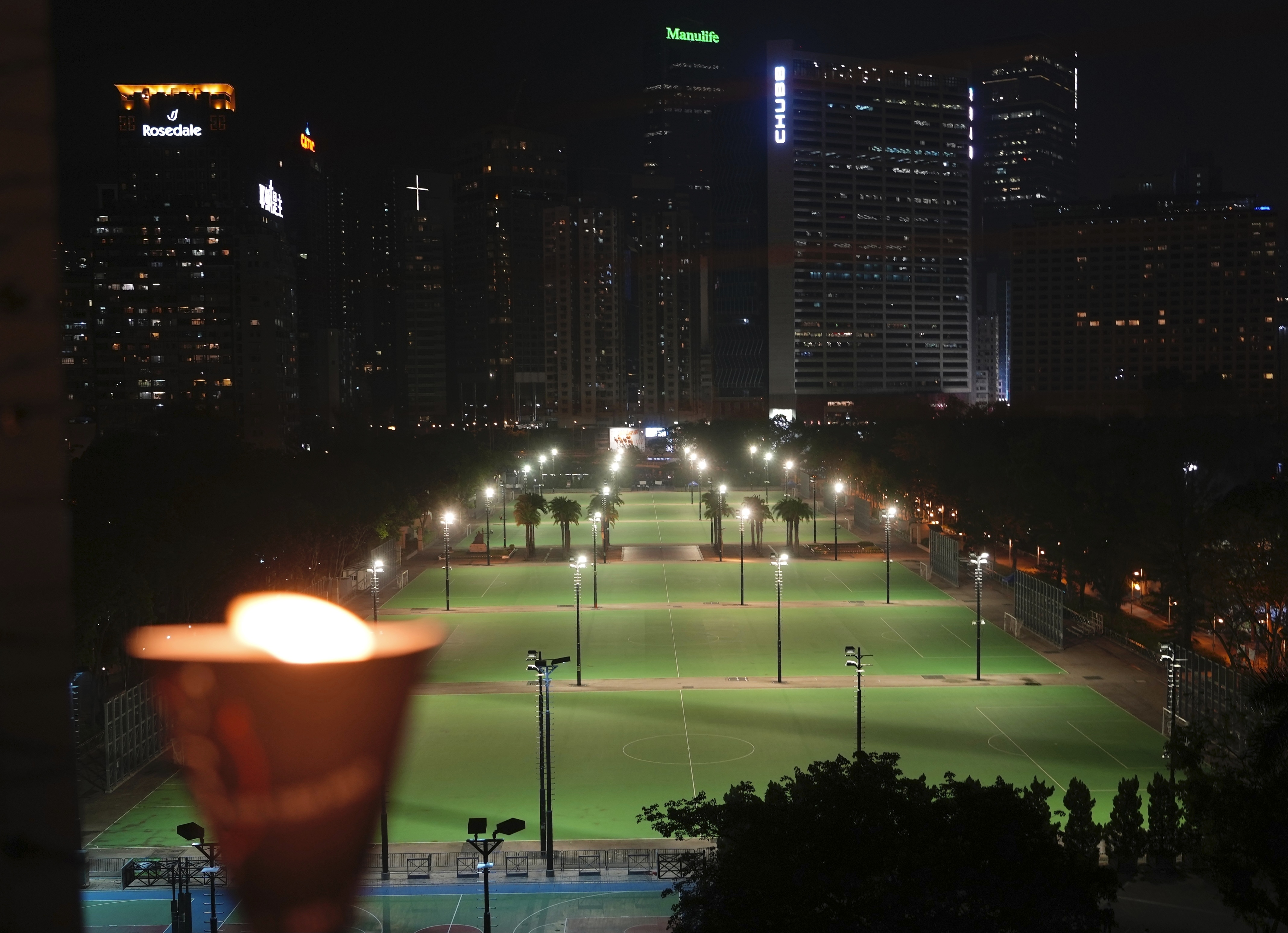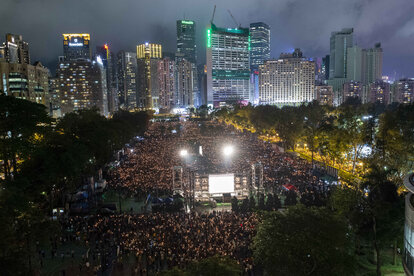Tiananmen Massacre
June 4th in Hongkong – a national security issue instead of a memorial

A candle stands near Victoria Park in Hong Kong on Friday, 4 June 2021. People have repeatedly gathered there for a vigil in recent years.
© picture alliance / ASSOCIATED PRESS | Vincent YuOne of the most iconic and longest running Hong Kong political satire cartoonists, Zunzi, published his last work shortly before June 2023. Zunzi has been publishing political cartoons in the Hong Kong newspaper MingPao Daily for 40 years. His works covered most of Hong Kong’s modern history. Making fun of politicians and officials from British Colonial Days, the handover, the early days of Hong Kong over the transfer of sovereignty, up to the crackdown under the National Security Law in the last few years. His works have been heavily criticised by Hong Kong officials in recent years. The Secretary for Security called his work ‘highly misleading’, where he ‘intentionally smeared’ the reputation of the Hong Kong Government. After several warnings and rounds of criticisms from officials, MingPao got the message and finally agreed to cease publication of Zunzi’s work. Zunzi’s political satirist work is not only an institution in itself, but it symbolises a once free and open Hong Kong society. Had Zunzi been allowed to publish his political cartoon this year, he would have definitely used his art to criticise the way the authorities now shut down the annual commemoration of June 4th to make sure no one would even mention the Tiananmen massacre either on the streets of Hong Kong or on social media.
4th June in Hongkong is now a security issue only
After three years of crackdown since the imposition of the National Security Law, there is no sign that the authorities have decided that enough is enough, and that it is time to roll back and restore the City to what it was at least partially. The fact of the matter is, once the national security apparatus has been set out, with constant funding from the Hong Kong public purse, the officials have to keep looking for things to do in order to justify their existence. This lead to their belief that national security risks are hidden everywhere. The statute ‘Pillar of Shame’ which commemorates the June 4th Tiananmen Massacre was taken down by the University of Hong Kong in 2021. Since then, the 2-tonne copper statute has been sitting inside a container yard stored and hidden away from the public’s eye. You would have thought this would be the end of the matter. But earlier in May this year, the national security police obtained a search warrant to seize the statute as part of its investigation for the crime of inciting subversion. How does a statute laying hidden from public view could possibly be a risk for national security is a mystery.
This is what the June 4th commemoration (or lack of it) looks like in the ‘new’ Hong Kong today. In the past, from 1990 to 2020, each year, hundreds of thousands of Hong Kongers would peacefully file into Victoria Park to attend the annual candle vigil to commemorate what happened on June 4th 1989 when thousands perished under the gun fire and tanks of the People’s Liberation Army. Hong Kong was the only place in China where open and peaceful commemoration of June 4th was allowed by the authorities. The Hong Kong Police would quietly watch on the sidelines to ensure peace and good order, and would never intervene. Democratic parties and the Hong Kong civil society would set up street stalls outside of Victoria Park to engage with Hong Kong citizens, selling memorabilia and collect donations. Never once had violence broken out during any of the annual gatherings. The candles would light up Victoria Park and the symbolises the hope and aspiration of a new democratic China. All of this is now a thing of the past.

June 4, 2019, Hong Kong, China: A candlelight vigil takes place in Hong Kong's Victoria Park to mark the 30th Anniversary of the Tiananmen Square massacre in Beijing China in 1989.
© picture alliance / ZUMAPRESS.com | Jayne RussellPro-China Groups in Victoria Park, Activists in Jail
The Hong Kong authorities are now concerned about the upcoming June 4th date, so they organised pro-China groups to occupy Victoria Park on June 4th in order to make sure no commemoration would take place. On the day, the Hong Kong police would surround all sensitive sites . The scene of hundreds of thousands turning up to Victoria Park with their candles would not be allowed to repeat under the new Hong Kong. What’s more is that the former leaders of the Hong Kong Alliance in Support of Patriotic Democratic Movement, the group which used to organise the June 4th commemorations, Albert Ho and Chow Hang-tung, are both in jail on charge for national security crimes. They have been denied bail before trial. Chow, a prominent pro-democracy activist and barrister, was chosen as the winner of this year’s Gwanju Prize for Human Rights. The prestigious human rights award from South Korea. A spokeswoman for the Seoul based foundation said it had received a visit from three Chinese consular officials, who were hoping to persuade the foundation to withdraw the award from Chow. The foundation refused. The fact that Chinese consular officials in South Korea were bold enough to make this move highlights the international nature of CCP’s repression. They not only want people within the China region to bend to their will, but expect others in democratic countries to follow suit.
Chow and others are now awaiting trial in Hong Kong. The 47 opposition leaders and pro-democracy politicians are now undergoing trial for subversion. Their cases dragging on under the disguises of the common law tradition, which is all but in name.
Tiananmen commemoration does not fit the “Great Rejuvenation”
Hong Kong authorities are following the line set by Chairman Xi in his 20th Party Congress speech delivered last October in Beijing. Xi repeatedly emphasized the need to protect national security from the areas of finance, cybersecurity, energy and the economy. That the whole country is now obsessed with national security is a sure hallmark of an authoritarian society. Hong Kong is now firmly within the orbit of the Chinese state. The commemoration of June 4th in Hong Kong is out of question. It does not fit with the national narrative of “Great Rejuvenation” hailed by Xi. Xi now turns his increasingly more aggressive attention towards Taiwan, where the Taiwanese people are expected to accept ‘One Country, Two Systems’ as the formula for reunification. As they look to Hong Kong, I expect the Taiwanese people to openly reject this offer, once again, in next year’s presidential election.
Dennis Kwok
Executive Director, China Strategic Risks Institute
Distinguished Scholar, School of Foreign Service, Georgetown University
